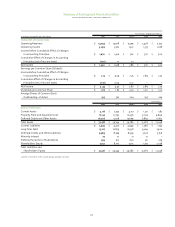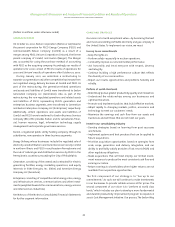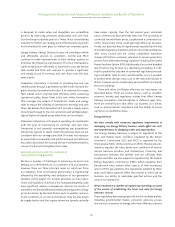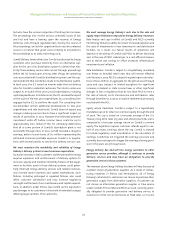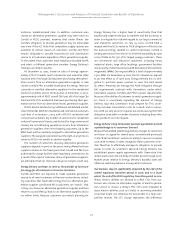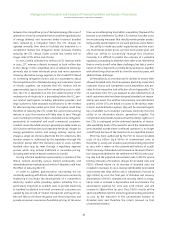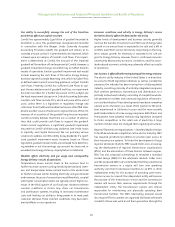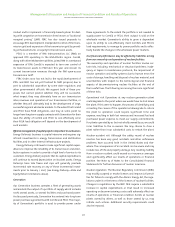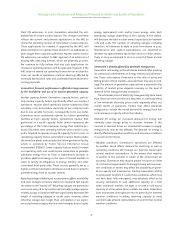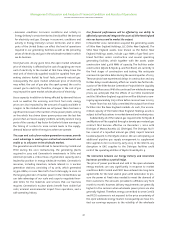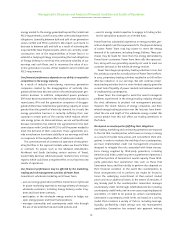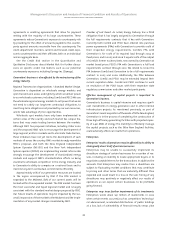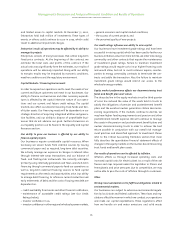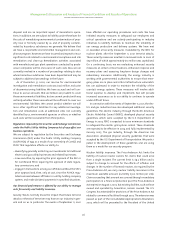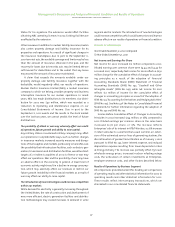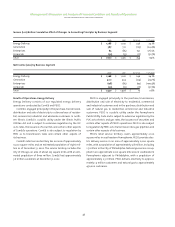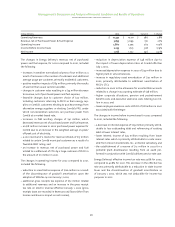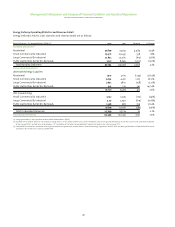ComEd 2002 Annual Report Download - page 32
Download and view the complete annual report
Please find page 32 of the 2002 ComEd annual report below. You can navigate through the pages in the report by either clicking on the pages listed below, or by using the keyword search tool below to find specific information within the annual report.
market and to implement a financially-based system for deal-
ing with congestion on transmission lines known as “locational
marginal pricing” (LMP). FERC has also issued proposals to
encourage RTO development,independent control of the trans-
mission grid and expansion of the transmission grid by provid-
ing enhanced returns on equity for transmission assets.
PECO is a member of PJM Interconnection, LLC (PJM), an
approved RTO operating in the Mid-Atlantic region. ComEd,
along with other Midwestern utilities,joined PJM in a westward
expansion of PJM. ComEd is expected to turn over control of
its transmission assets to PJM later this year and recover its
current transmission revenues through the PJM open-access
transmission tariff.
FERC Order 2000 has not led to the rapid development of
RTOs and FERC has not yet finalized its SMD proposal, due in
part to substantial opposition by some state regulators and
other governmental officials. We support both of these pro-
posals but cannot predict whether they will be successful,
what impact they may ultimately have on our transmission
rates, revenues and operation of our transmission facilities, or
whether they will ultimately lead to the development of large,
successful regional wholesale markets.To the extent that ComEd
and PECO have POLR obligations, and may at some point no
longer have long-term supply contracts with Generation for their
load, the ability of ComEd and PECO to cost effectively serve
their POLR load obligation will depend on the development of
such markets.
Effective management of capital projects is important to our business.
Energy Delivery’s business is capital intensive and requires sig-
nificant investments in energy transmission and distribution
facilities, and in other internal infrastructure projects.
Energy Delivery continues to make significant capital expen-
ditures to improve the reliability of its transmission and distri-
bution systems in order to provide a high level of service to its
customers.Energy Delivery expects that its capital expenditures
will continue to exceed depreciation on its plant assets. Energy
Delivery’s base rate freeze and caps will generally preclude
incremental rate recovery on any of these incremental invest-
ments prior to January 1, 2007 (see Energy Delivery—Rate and
Equity Return Limitations above).
Generation
Our Generation business operates a fleet of generating assets
and markets the output of a portfolio of supply, which includes
100% owned assets, co-owned facilities and purchased power.
As discussed previously, Generation has entered into long-term
power purchase agreements with ComEd and PECO.The major-
ity of Generation’s portfolio is used to provide power under
these agreements. To the extent the portfolio is not needed to
supply power to ComEd or PECO, their output is sold on the
wholesale market. Generation’s ability to grow is dependent
upon its ability to cost-effectively meet ComEd’s and PECO’s
load requirements, to manage its power portfolio and to effec-
tively handle the changes in the wholesale power markets.
Our financial performance may be affected by liabilities arising
from our ownership and operation of nuclear facilities.
The ownership and operation of nuclear facilities involve cer-
tain risks, including: mechanical or structural problems; inade-
quacy or lapses in maintenance protocols; the impairment of
reactor operation and safety systems due to human error; the
costs of storage,handling and disposal of nuclear material;and
uncertainties with respect to the technological and financial
aspects of decommissioning nuclear facilities at the end of
their useful lives.The following are among the more significant
of these risks:
Operational risk. Operations at any nuclear generation plant
could degrade to the point where we would have to shut down
the plant. If this were to happen, the process of identifying and
correcting the causes of the operational downgrade to return
the plant to operation could require significant time and
expense, resulting in both lost revenue and increased fuel and
purchased power expense to meet our supply commitments.
For plants operated by us but not wholly owned by us,we could
incur liabilities to the co-owners. We may choose to close a
plant rather than incur substantial costs to restart the plant.
Nuclear accident risk. Although the safety record of nuclear
reactors has been very good, accidents and other unforeseen
problems have occurred both in the United States and else-
where.The consequences of an accident can be severe and may
include loss of life and property damage. Any resulting liability
from a nuclear accident could exceed our insurance coverages
and significantly affect our results of operations or financial
position. See Note 19 of Notes to the Consolidated Financial
Statements for further discussion of nuclear insurance.
Nuclear regulation. The Nuclear Regulatory Commission (NRC)
may modify, suspend or revoke licenses and impose civil penal-
ties for failure to comply with the Atomic Energy Act, the regu-
lations under it or the terms of the licenses of nuclear facilities.
Changes in regulations by the NRC that require a substantial
increase in capital expenditures or that result in increased
operating or decommissioning costs could adversely affect our
results of operations or financial condition. Events at nuclear
plants owned by others, as well as those owned by us, may
initiate such actions. Additional security requirements could
also be imposed.
Management’s Discussion and Analysis of Financial Condition and Results of Operations
exelon corporation and subsidiary companies
30





